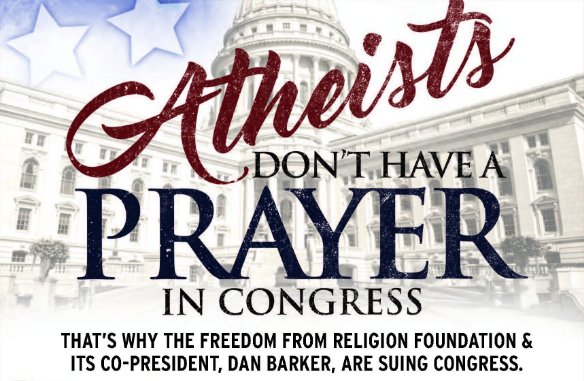
The Freedom From Religion Foundation is filing an appeal of a district court ruling in October that legitimized the exclusion of nonbelievers from the nation’s legislative chambers.
U.S. District Judge Rosemary M. Collyer (Washington, D.C.), a President Bush appointee, ruled against plaintiff Dan Barker in his historic lawsuit against House Chaplain Patrick Conroy for barring him as an atheist from delivering a guest invocation. Also named as a defendant in Barker v. Conroy was Paul Ryan, speaker of the House, who oversees the chaplain’s office.
The case began when U.S. Rep. Mark Pocan, D-Wis., who represents Barker’s district in Madison, Wis., requested that Barker, who is co-president of the Freedom From Religion Foundation, give the opening invocation before the House. Usually, such sponsorship is all that is necessary to be named guest chaplain.
Although the chaplain has no written requirements for guest chaplains, Conroy also required proof of Barker’s ordination, which Barker, a former minister, produced. Then Conroy declared that Barker could not deliver the opening invocation because he lacks belief in “a higher power.” Barker responded by submitting a draft of his invocation, in which he noted that he could indeed invoke a “higher power”: “There is no power higher than ‘We, the People of the United States.'”
In the legal complaint, Barker noted that from the years 2000 to 2015, 96.7 percent of all guest chaplains have been Christian, although Christians are 70.6 percent of the U.S. population; most other religions were underrepresented. Fully 99.8 percent of recent invocations have been by officiants from Abrahamic religions.
No atheist or agnostic has been allowed to officially offer the opening invocation before Congress. “Shouldn’t the House of Representatives be representative?” asks Barker.
Congress spends about $800,000 a year on its opening prayers, including the annual salary of $172,000 for Patrick Conroy, a Roman Catholic priest, as well as a salary and office for the Senate chaplain. Conroy’s sole duty, Barker points out, is to “offer a prayer at the commencement of each day’s sitting on the House” — roughly 135 times per year — a duty that Conroy delegates to a guest chaplain approximately 40 percent of the time. FFRF calculates that in 2011 Conroy earned $1,659 per prayer.
In her decision dismissing the suit, Collyer ruled that neither of the defendants ultimately was responsible for the injury Barker suffered.
The judge claimed that the chaplain was powerless to allow Barker to give the invocation, due to House rules, yet also dismissed Barker’s claim against the House itself. The decision fails to identify who, if not the House chaplain and the House itself, could be sued for implementing a rule excluding nonbelievers from participation.
At the time of Collyer’s ruling, House Speaker Ryan applauded it, saying “the freedom to exercise religion was vindicated. The court rightfully dismissed the claims of an atheist that he had the right to deliver a secular invocation in place of the opening prayer.”
Under her ruling, the congressional program remains closed to community leaders representing the 23 percent of Americans overall (including 38 percent of Millennials) who are nonreligious.
“It is unseemly and unacceptable that a Roman Catholic priest paid by tax dollars should deprive a nonbeliever of the opportunity of giving a House invocation. This is treating all atheists and other freethinkers like second class citizens,” says Annie Laurie Gaylor, FFRF co-president. Gaylor remarks it is lamentable that little has changed in Congress since 1854, when the chaplain refused to allow well-known atheist Ernestine L. Rose to speak in the Capitol on a Sunday morning against slavery, solely because she was an atheist.
“It’s time the House, the chaplain and Paul Ryan acknowledge that the United States, founded upon secular principles, welcomes citizens of all religions or no religion, and does not tolerate bigotry against nonbelievers,” she adds.
The motion to appeal was filed on Dec. 8 and goes before the D.C. Court of Appeals.

